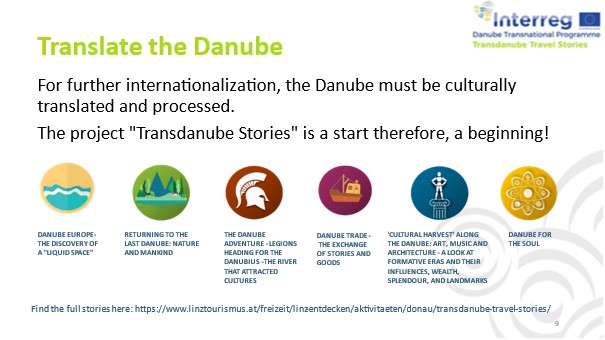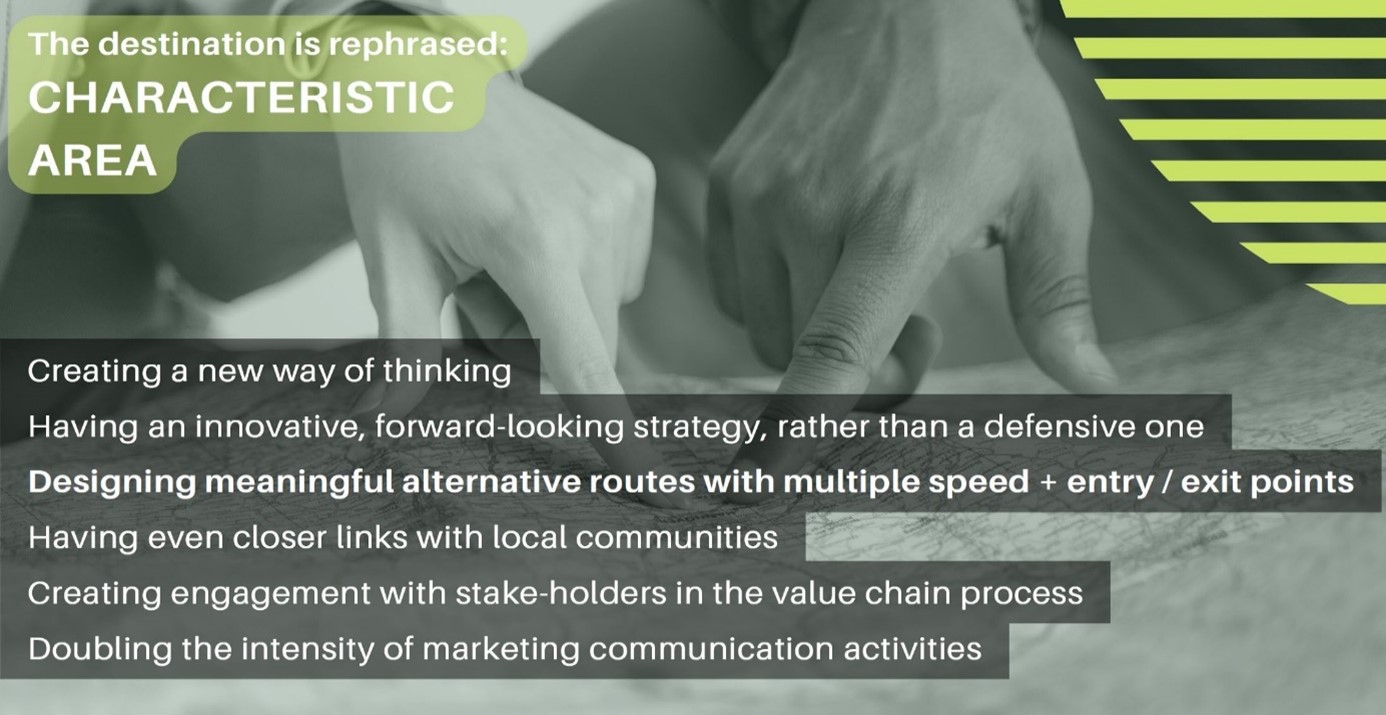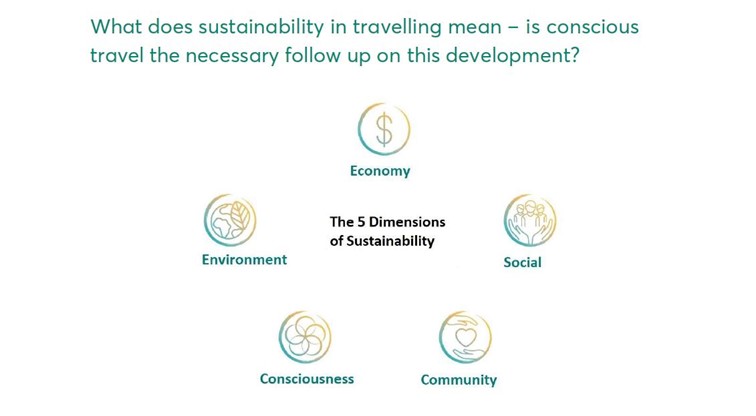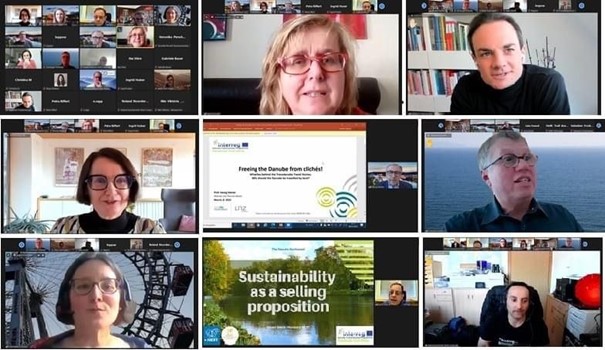Transdanube Travel Stories - THE DANUBE REPHRASED – INSPIRATION AND IDEAS FOR ROUTE-BASED TRAVEL PRODUCTS ALONG THE DANUBE
16-03-2022
THE DANUBE REPHRASED – INSPIRATION AND IDEAS FOR ROUTE-BASED TRAVEL PRODUCTS ALONG THE DANUBE
Online-Panel, 08.03.2022, hosted by Linz Tourism
Report by Sylvia Amann – inforelais
The EU-INTERREG-project Transdanube Travel Stories aims at reinventing tourism in the Danube region based on the principles of sustainability. In order to further reflect on these transformation activities, an online conference was held with tourism visionaries and thinkers as well as a wide range of participants from the tourism and experience eco-system in March 2022.
PART 1 – CHANGE IN TOURISM, OFFERS AND CUSTOMER EXPECTATIONS, MARKETING AND PROJECT BASICS
The speakers provided deep insights to the current major transformations which have started in the tourism system in general as well as for new offers in the transnational setting of the Danube:
Professor Georg Steiner, Tourism Director Linz, emphasised that experiences are much more than visiting. The experiences of a guest will become memorable. In order to allow for the experiences of visitors, the development of tourism routes might be one important way forward.This approach especially well fits the tourism development at the river Danube – being by its nature already a path transgressing a wide range of places and related narratives. In the framework of the EU-INTERREG-project Transdanube Travel Stories new travelling routes are under development:
.  .
.
Thinking and developing further tourism products and services on the basis of these narratives will allow to widen perspectives from the offer- and the demand-side.
Professor Terry Stevens, Author and international tourism consultant, sent a video message on ways out of the tourism crisis and reflected on changes in products and needs of travellers. He emphasised the need for hybrid thinking to answer to the rapid transformation. The pandemic, for him, has the potential to act as an eye-opener and to invest in new communities. This new understanding would imply to reflect on a destination as a community and to enlarge the concept to collective responsibility. In this new context, travellers will look for what destinations care about and if this fits their value-set.
.  .
.
Professor Gábor Bodis, Lecturer at the Budapest Metropolitan University, reflected in his speech on sustainability as a selling proposition. He stressed the need of rephrasing travellers, destinations, measures, and the future. Travel habits will continue as it is the very nature of human beings to move. What is important is to understand the nature of the new travellers, to reflect on their new needs and expectations. In this context, the community becomes crucial – also to translate the values of a need for qualitative people-to-people contact and exchange.
.  .
.
The development of new travel routes involving better links with local communities is an excellent way forward related to the Danube destination. However, it will need considerable marketing effort.
The sustainable travel entrepreneur, Julia Balatka, continued with a speech on sustainable travel and the underlying principles as developed by the Conscious Tourism Group (CTG). While the broad discussion on sustainability mainly reflects on the economic, ecological and socio(-cultural) dimensions of the concept, the CTG approach includes an additional pillar on consciousness – as the context matters – as well as the fifth dimension “communities”. The latter is even perceived as the central aspect as a community-based approach will transform tourism offers to a sustainable practice. Furthermore, she promotes the guiding principle of thinking how others including future generations will be still able to enjoy the same positive experiences as the current generation can.
. .
.
A first round of debate with the participants brought to the fore a range of key questions and aspects to be further considered for new visionary tourism developments.
The effects of the pandemic have rather strengthened conventional mass tourism – especially in the segment of Danube cruise tourism, consider some of the participants. This is one further reason why the project “Transdanube Travel Stories” aims at thinking far beyond cruise tourism and develop new offers to discover the Danube from new angles and perspectives. Furthermore, participants think that the tourism sector requires considerable transformation – especially related to sustainability. Developing routes provide the traveller with an easy access option while at the same time offering new approaches and an opportunity for more sustainable practices. In order to achieve more profound change in current practices, the tourism sector cannot be left alone, emphasised the participants. The political level has also a role to play and request from the big players in the tourism industry more sustainable approaches (e. g. limit the number of cruise ships per day). On the other side, customers need to be brought in contact with different cultures and to become open for these kinds of offers. Developing new offers allowing for more immediate contacts like Air BnB-type of accommodation suggest some participants for the Danube tourism.
PART 2 – BEST PRACTICES ROUND TABLE: EXPERIENCE AND ENCOUNTERS
The panel debate between Bernd Loppow (ZEIT-REISEN Programme Manager), Dr. Roland Kastler (Kastler Reisen Owner), Dr. Christoph Mülleder (Weltanschauen.at Owner), and Sebastian Frankenberger (Donau Guides Owner) brought together different insight in current sustainable and Danube practices.
Based on the experiences with ZEIT-REISEN offers, Bernd Loppow reports, that especially narratives which generate wider connections meet the special interest of the travelling customers. For many years, a lighthouse offer was the ZEIT-REISEN trip between Hamburg to Shanghai. An offer developed currently under the moto of “Reinventing the Danube” has similar potential as it allows for a discovery trip during 33 days down to the Black Sea. However, the current political developments might make this trip more challenging.
Roland Kastler added on these first reflections his perception of a fundamental ongoing change in travelling which must lead to a stronger focus on consciousness and knowledge-based journeys. For Christoph Mülleder travelling practices and related tourism offers must be harmonised with social and societal objectives. A fair tourism can be valuable for local communities and is able to protect the nature. He perceives this also as an obligation for the richer parts of the world. Travellers from these countries should use their trips also to learn and to take over responsibilities in a broader global context.
Sebastian Frankenberger stresses the fact that the whole tourism eco-system needs to be better taken into account including beyond the sole tourism companies. If travel means meeting people, those interacting with travellers need also to be trained to interact. This requires e. g. training programmes for taxi drivers.
The panellist further agreed that meeting travellers requires first also a deeper reflection on customers. Who are the customers open-minded to buy these kinds of new offers. Some of the owners of the travel agencies present reports of some challenges as the potential customers seem not yet to be fully ready to participate in new tourism offers. Niche markets seem to work well for sustainable tourism, more doubts are expressed related to the big players in the tourism industry as well as to the broad masses of tourists. Furthermore, these offers require also a bigger effort to be developed and implemented. Tailored information for travellers with very different background know-how (e.g. on arts or on politics) must be picked-up from the guides at very different levels. This requires considerable communication capacities and a high level of own expertise.
In the second round of debates, participants further stressed the central role of the local communities and residents. If e. g. new narratives are told about the Danube and travellers should discover these new stories in interaction with local people, it is crucial to involve the local communities. This fact needs to be addressed in the course of the project development, recommend participants. Others add that especially the Danube allows for a wide range of thematic connections and that the fact of travelling in connection with a waterway will always provide the opportunity to connect with the universal value of water.
In addition, some settings when planning routes will further ease these new ways of doing tourism and at the same time enhance interaction: It seems to be of added value to plan for time to meet people or just for free time in order to be able to connect to a place. Splitting in subgroups and connect with local people as guides is another good practice.
Furthermore, additional challenges have to be addressed in the tourism eco-system: The will and interest to cooperate and exchange across borders must be enhanced, say participants. If tourism guides would be more open for transnational cooperation, much better offers (based on integrated narratives) could be developed. The time of repeating of factual knowledge is definitively over when all the information is available on smart phones.
The added value of travelling and encountering while travelling is to get the opportunity to exchange with people and to understand their viewpoints. These encounters require investment in the openness of local communities to interact and to exchange.
.  .
.
In his concluding remarks, Professor Georg Steiner, stressed the fact that the modernisation of the tourism offer in the Danube region is on a promising way. While a wider range of difficulties still need to be overcome, the community built around the project “Transdanube Travel Stories” is an excellent starting point for further common efforts and sustainable future development.
WATCH BACK THE EVENT HERE

